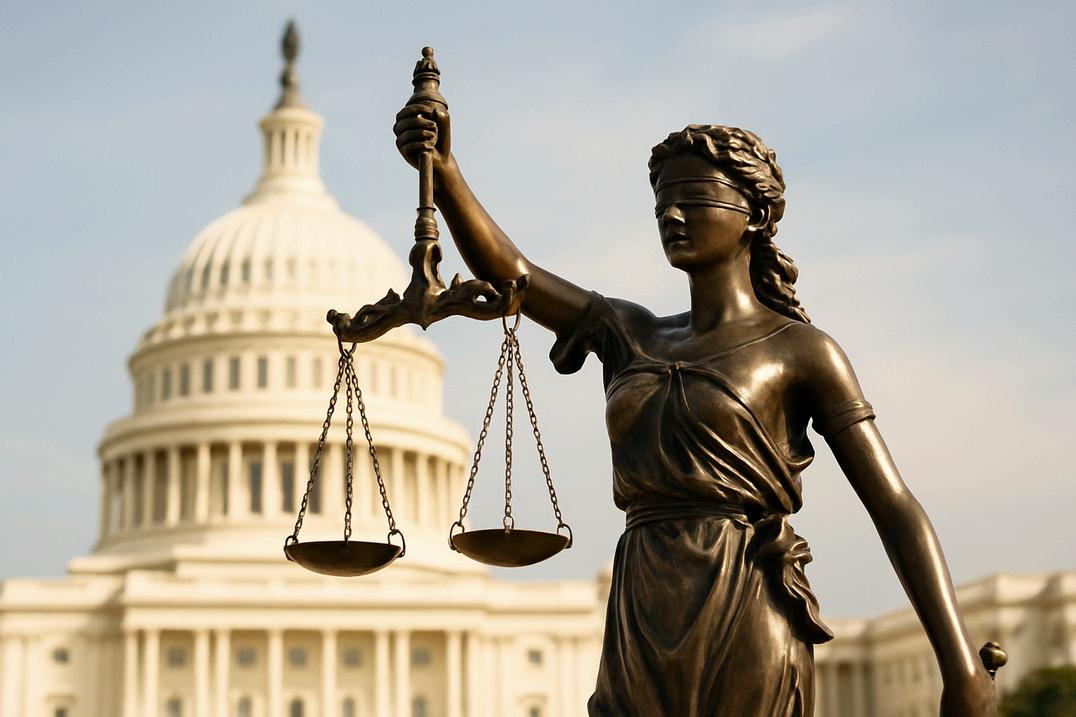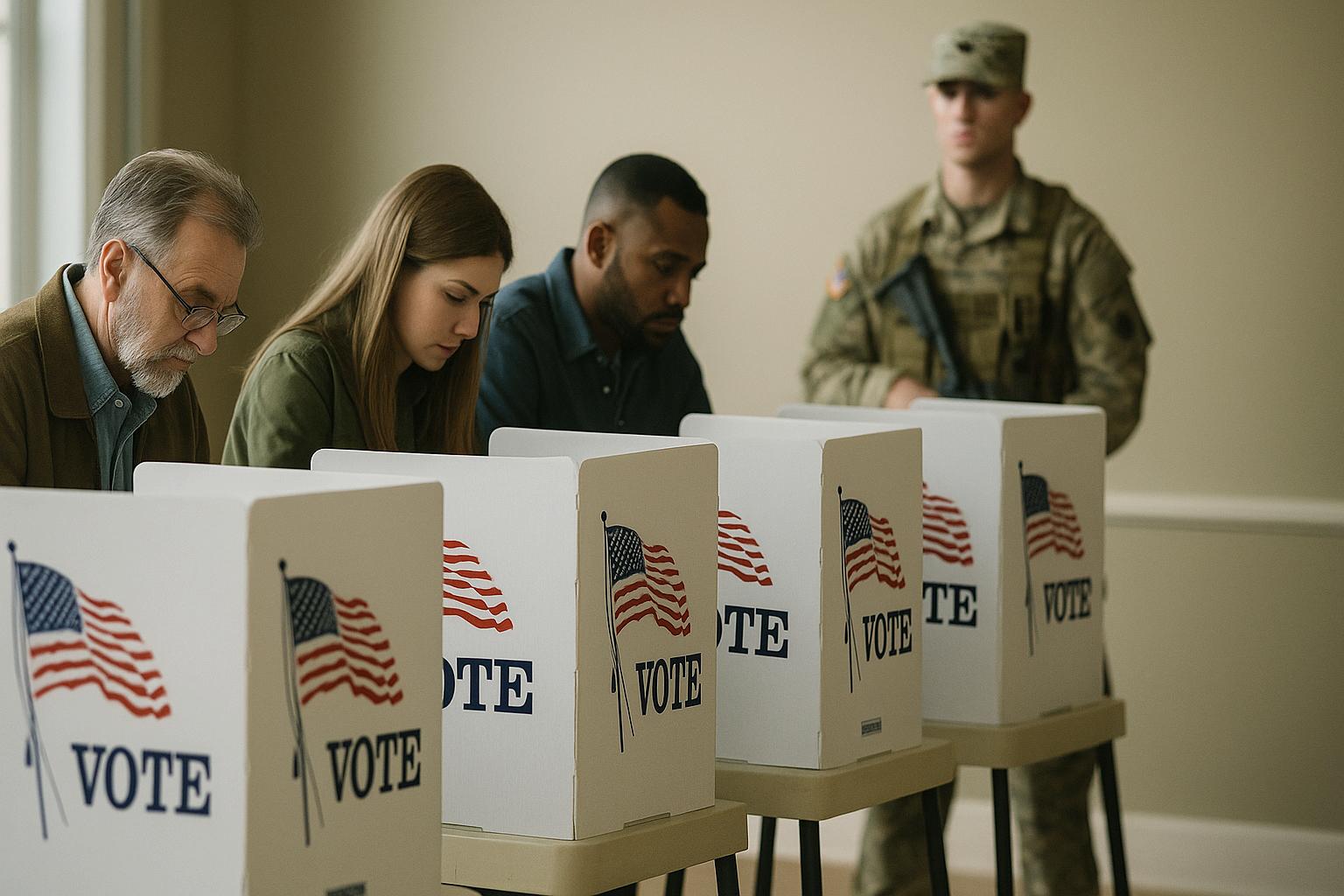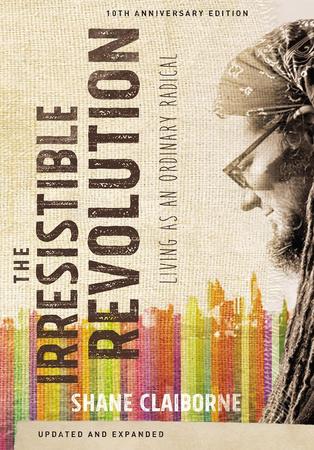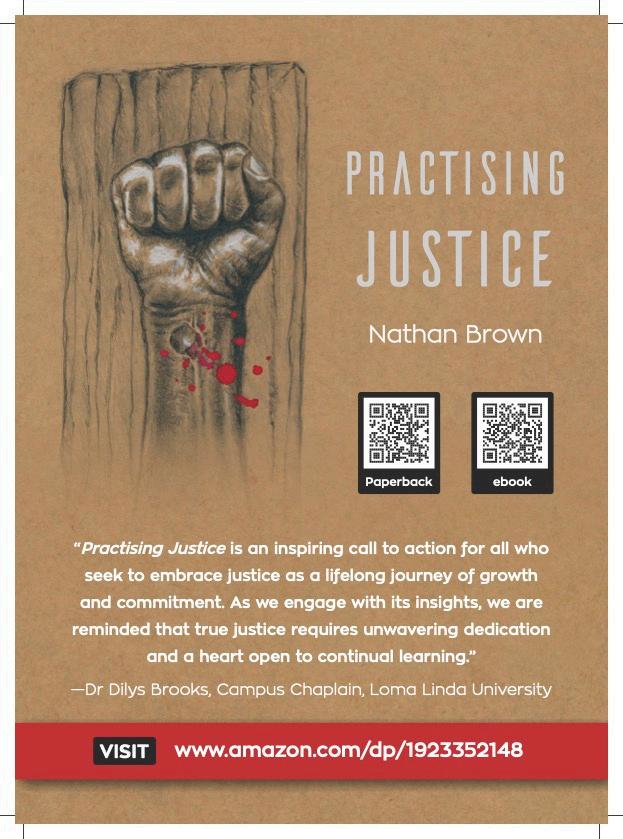
OCTOBER 2025
ISSUE 19
FROM SUCKER PUNCH TO CHARLIE KIRK’S DEATH
SEPARATING NATIONALISM AND CHRISTIANITY
THE UNITED STATES IN THE GOOD SAMARITAN STORY
BIG BRANDS AND THE WAR IN GAZA
THE DEATH OF DEMOCRACY IN THE UNITED STATES






OCTOBER 2025
ISSUE 19
SEPARATING NATIONALISM AND CHRISTIANITY
THE UNITED STATES IN THE GOOD SAMARITAN STORY
BIG BRANDS AND THE WAR IN GAZA
THE DEATH OF DEMOCRACY IN THE UNITED STATES




Why we must stop calling our opponents monsters.


Right after Donald Trump was inaugurated as president in 2017 someone punched white nationalist Richard Spencer in the face on live television This led to several days of the internet asking whether it is okay to sucker punch Nazis.
(The answer, for those who missed that session, is that no, it is not OK to sucker punch people who have noxious views, because it is not OK to sucker punch people, period.)
At the time I was deeply disturbed to see how many people were willing to endorse political violence. In retrospect, this seems almost quaint.
We don’t know the motive of the shooter who killed conservative activist Charlie Kirk The shooting may have been politically motivated, or simply a bid for fame, or it may have been the result of some psychotic obsession incomprehensible to a normal mind.
But it’s quite reasonable to fear that this was a political assassination, because over the past decade, political violence has become much more normalized than it was when people were wringing their hands over a simple punch that did no lasting harm to its victim We’ve seen more violent protests, from antifa to the January 6 mob, and more targeted attacks. The decade has brought us attempted assassinations of a conservative Supreme Court justice, Republican
Stand down and knock it off.
cultural forces that point sick people toward this most destructive and dangerous form of violence
The most obvious place to start is with the legions of keyboard warriors, 101st Chairborne Division, who enjoy spinning online fantasies about hurting their political opponents or glorifying those who do, like Luigi Mangione
Almost all those people are just talking, trying to signal their ideological purity or make themselves feel tougher and more courageous than their nondescript white-collar job would otherwise suggest. But they are giving ideas to those who want to do more than talk, including the idea that hurting other people can be a shortcut to fame. So stand down and knock it off. You are not a member of the online French Resistance; you are a soft and silly adolescent engaging in performative sociopathy to compensate for your real-world deficits
Speaking of the French Resistance another way to lessen the risk of political violence is to stop amplifying your political disputes into existential threats
There has long been a left-wing cottage industry using dodgy data to conjure up an exaggerated threat from right-wing “domestic terrorism ” (The threat exists, but the numbers thrown around are inflated.) On liberal social media, one cannot go long without stumbling across some expert claiming to have diagnosed America’s descent into fascism, rather than more ordinarily bad governance. There are just as many self-panickers on the right ranting about deep state conspiracies and cultural Marxism In the wake of Kirk’s shooting, some of those announced that “they” had declared war on conservatives, as if the entire left (most of whom were appropriately horrified by the killing) had voted to put a guy on that rooftop. With relish,
conservatives shared and reshared the same handful of low-follower social media accounts celebrating the violence
In a country of more than 340 million people, there will be people who do terrible things and many more who say terrible things but while these people are too numerous, they are statistically a tiny share of our overwhelmingly sane and law-abiding electorate Acting as if they are representative or comparing your opponents to your least favorite dictatorship, risks provoking weak minds to violent countermeasures against the dire threat you’ve conjured
Which brings me to a final point: Stop monstering your opponents In the wake of Kirk’s killing, a lot of the responses from the left ran along the lines of, “Sure, he was human garbage, but you still shouldn’t kill him.” When others pushed back, people stood their ground Why shouldn’t we speak ill of the dead or those who offered respectful eulogies, if they were terrible people?
One answer is that it’s a bit cowardly to criticize the dead, who can’t reply. Another is that politically, it’s a bad look; adding to the pain of a family in mourning seems spiteful and petty in the face of the momentousness of death. But the most important answer is that this country needs fewer impassioned denunciations and more understanding of our opponents as complicated people who can hold bad ideas while also exhibiting praiseworthy virtues
Of course, it’s more satisfying to fight monsters than flawed humans who are, like you, struggling their way through this vale of tears. But if you insist on hunting for monsters, you run the risk that some of your hunting companions will decide to go in for the kill.


It should not be controversial to exhort Christians to tangibly show compassion and care for members of our society Nevertheless, urgings like this are often met with responses that balk at the notion that the church should be concerned about love or social justice A notable contingent believes this talk of “love” is just “milk” not the real “meat” of mature Christians. Furthermore, they contend, it is inappropriate for the church to be involved in matters that are best left to secular government, asserting that preaching sermons about helping others is “politicizing” religion Many who believe this simply ignore all the emphases throughout the Bible imploring God’s people to actively address others’ suffering Apparently, Christians’ time is best spent in self-absorption to figure out how to appear more “holy.”
It is disappointing that the church is abdicating its responsibilities toward the alleviation of societal harms and trivializing that responsibility as a “political” pursuit Meanwhile, some wings of government at least in the US argue that it is not the government’s duty to tend to those who are hurting. Instead, they uphold that caring for others should be up to neighbors and charitable organizations such as churches. Those who are hungry, unhoused, and displaced are someone else’s problem Helping those in need seems to be a hot potato everyone wants to toss to someone else. It is all the more ironic when the parties involved
include those who claim the US is a “Christian nation ” In their ideal vision, the US is a Christian country in which church and state are merged, yet neither the government nor the church believe it is their responsibility to help those who are most vulnerable
Some still maintain that Christian Nationalism is not problematic.
Let us not forget, those of us who identify as Christian profess belief in a religion that calls for compassion toward those who are poor, marginalized, and disenfranchised, targets of unjust systems, refugees, and orphans Support of this can be found across the Bible: Leviticus 19:33, 34; Deuteronomy 15:11; Deuteronomy 27:19; Proverbs 19:17; Proverbs 31:8, 9; Isaiah 1:17; Isaiah 10:1, 2; Isaiah 58:6, 7; Micah 6:8; Matthew 22:39; Matthew 25:31-46; and James 1:27. Scripture’s command to attend to the needs of our neighbors is not confined only to those who share our background or nationality (Luke 10:25-37). While many of us fret about not appearing too political, some factions relish the chance to inject their religious influence into government and intertwine politics with faith. I have written before about the dangers of
Christian Nationalism, citing reputable sources to every claim. Despite my thoroughness in exposing the perils of giving Christian Nationalists a platform in Adventist congregations, my work garnered a few comments some exceptionally long that boiled down to “nuh-uh!” Some people’s preconceived notions kept them from accepting that “noticing” is an alt-right antisemitic term and that right-winged media personality and activist, Charlie Kirk, is dog whistling to other white supremacists when he says it. Kirk boldly flaunts these antisemitic views, alongside his sexism and racism, and funnels these Christian Nationalist beliefs into his partisan organization, Turning Point USA Despite its obvious overtures of racism and sexism, some still maintain that Christian Nationalism is not problematic.
When U S Secretary of Defense Pete Hegseth reposts a video of his pastor, Doug Wilson, speaking about his church’s desire to infuse its beliefs into government to create a theocracy that should be an undeniable cause for alarm This is disturbing not just because some far-right pastor has some wacky ideas, but because those ideas are being embraced by people at the upper echelons of government. This is not speculation, fearmongering, or being unduly critical of people who do not espouse what I claim they do This is a government official unabashedly proclaiming that Christian Nationalist principles are ones he embraces including the belief that slavery was not entirely bad since there were some presumably good enslavers, that women should not vote, and that “women are the kind of people that people come out of” because “it doesn’t take any talent to simply reproduce biologically.” This is a pastor boasting about Christian Nationalism’s connections to the US executive branch and its influences on the president a blatant admission that the current administration is being infected by this ideology Furthermore, this is a declaration that the goal is to spread this dogma, not just throughout the country, but across the world. These are Wilson’s words words gleefully shared on social media by a top US government official.
Looking at the 900-page Project 2025, which was architected by the Heritage Foundation some dismissed this right-winged roadmap as unserious. But over the last six months President Donald Trump has implemented almost 50 percent of its proposals That same Heritage Foundation has published another plan: Project Esther. This time the scope is international Those familiar with the Old Testament book recall that Esther was able to use her position to expose plans to harm the Jews and bring about the destruction of their enemies Most of the story is centered on Haman, who is eventually hanged Ultimately, all those who were against the Jews were annihilated during Purim
The first paragraphs of Project Esther refer directly to this story, ending with this chilling proverb: “So many Hamans, and only one Purim”! In their zeal to push Zionism as a means to supposedly usher in the reign of Christ, the Heritage Foundation seeks to eliminate everyone they perceive to be a “Haman,” defined in later paragraphs as anyone who criticizes the Israeli government or expresses sympathetic sentiments toward Palestinians.
The project’s creators avow their desire to “protect American Jewry” and “the sanctity of the core values derived from our Founding documents ” From Project 2025, we have seen what their “core values” entail They pointedly state that their methods include a plan to “orchestrate actions and activities across society in collaboration (where appropriate) with federal and state government to achieve the desired impact and align resources toward priorities ” In this document they juxtapose “all proud Americans” against “Palestinian, Arab, or Muslim” people. In their minds these identities are diametrically opposed and mutually exclusive The project’s authors expose their already known bigotry by grossly equating the purported coordinations of Hamas’s pogrom with “a George Floyd-style event” because to them, the cold-blooded murder of an unarmed Black man by a smirking police officer in a public setting in broad daylight was simply an “event” for publicity
In their stated objectives to squelch any support for Palestine and all criticisms of the Israeli government, the Heritage Foundation classifies anyone who does either of these as part of a so-called “Hamas Support Network.” They argue that these individuals should face punishment from the American government and private organizations, including but not limited to restrictions on access to education, removal from public office and academic appointments, being barred from social media, being prevented from exercising their First Amendment right to protest, and being kept from the ability to buy, sell, or participate in the US economy. This should alarm of scholars of the book of Revelation
The U.S. has often played a role in landing people in harm’s way in the first place.
Heritage Foundation’s missive even lists several Jewish people who allegedly abet Hamas and outlines how it is the job of the Project Esther progenitors to save Jews from their own community, as they assert that, as a whole, it has been derelict in the defense of its own people. This foundation seeks to use their feigned concern for eliminating antisemitism to strengthen support for the Israeli government’s genocide of Palestinians. If their care for the Jewish community was genuine instead of painting those concerned with human rights abuses as part of some antisemitic cabal they would focus on actual antisemitic actions and tropes spread by current alt-right leaders and influencers.
This is not the first time we have seen the veneer of caring about “protecting” one group applied as a guise to hurt another Misogynists use the label of “promoting women’s rights” in their attacks against the LGBTQ community; pedophiles employ the cover of “saving the children” to dismantle education; racists invoke
saving “Black jobs” as an excuse for xenophobic deportations; antisemites pretend to care about “protecting Jews” to lend credence to their antiMuslim, anti-Palestinian agenda a word that appropriately describes a 30-page blueprint about how to execute their proposed mission against groups they have declared as their enemies.
When someone tells you who they are, believe them. Bigots are brazenly posting their machinations to use religiosity as a vehicle to leverage influence in the government to achieve their goals of harming others and advancing supremacist ideals across the world. All while the people of God are busy arguing about whether preaching sermons on helping the poor is getting “too political.” Wake up!
We are the hands and feet of Christ One of those hands should be extending aid, offering assistance, and relieving the pain of those suffering in oppression and impoverishment. The other hand should be used to actively fight against those who want to co-opt Christianity to use as a conduit of hate. As the apostle Paul wrote: “If I have the gift of prophecy and can fathom all mysteries and all knowledge, and if I have a faith that can move mountains, but do not have love, I am nothing” (1 Cor 13:2)
Sharing love, opposing hatred: it really is that simple. If not us then who? If not now, then when?
Groups such as JustLove Collective, Conscience and Justice Council, Adventists for Social Justice, and Adventist Peace Fellowship, among many others, have been working in this vein. It is not partisan to do so. And it is not a responsibility Christians ought to pawn off on someone else
It is up to us.


When I am acclimating myself to my neighbors, one of the things I enjoy doing is asking how they came to be my neighbors You never really know people’s backgrounds, and it’s always interesting to see people light up at the opportunity to tell you a bit about themselves Often, both in Washington D C and my home state of Texas, I’ll run into people from Ethiopia. When I went to college in Austin, I got to know a lot of people whose families came from Ethiopia. In getting to know them, I learned about the conflicts that have forced people to leave their homes in 2022 and obtain protection under Temporary Protected Status (TPS) because of the nation’s ongoing wars and humanitarian crises. The TPS designation allows migrants to live temporarily in the U S when they cannot return to their countries safely, often because of dire circumstances. For the Ethiopians I met, TPS offered an escape from physical danger and a chance to thrive in the U S while they worked to end the conflict back home and care for their loved ones as best they can
These classmates, neighbors, and friends have been on my mind as I’ve read about President Donald Trump’s attempts to terminate Temporary Protected Status for Haitians, Hondurans, Nicaraguans, Venezuelans, Afghans, Cameroonians, and Nepalis. Recently, a federal
TPS offered an escape from physical danger and a chance to thrive in the U.S.
temporary protection to return home, and, further, that criminals have abused the program. “For decades, TPS has been abused as a de facto amnesty program to allow unvetted aliens to remain in U.S. indefinitely,” said a news release from the Department of Homeland Security. “Too often these programs have been exploited to allow criminal aliens to come to our country and terrorize American citizens.”
Neither claim by the Trump administration holds up to scrutiny Let’s take Venezuela for example: While the Trump administration has terminated TPS status for many Venezuelans living in the U S , it’s also sending Navy ships to threaten “drug cartels” the administration claims are running the country. Now, we can hold a healthy skepticism of Trump’s claims and his impulse to intervene militarily, but it seems odd for a country to be safe enough for its migrants to return, yet so unsafe it needs U S intervention Furthermore, the American Immigration Council’s analysis of crime and demographic data found that as shares of the immigrant population grew in the U S , the crime rate actually fell In other words, removing TPS status doesn’t protect people from criminals; it just winds up sending people back into recognized conflicts
So far, tens of thousands of people who had previously been protected by TPS are now living in fear and uncertainty as efforts to end TPS make their way through the U S court system While many of the administration’s attempts have been initially blocked by judges, higher courts are gradually clearing the way for the administration to proceed unless another court intervenes. This leaves TPS holders in an anxious limbo when they are already monitoring conflicts and disasters at home a move that demonstrates the administration’s determination to target people with maximum hostility who are already vulnerable
But let’s back up Theologically, there’s a problem with the Good Samaritan analogy when it comes to TPS: While we may like to think of the U S as the Good Samaritan who takes care of vulnerable neighbors, this ignores the role the U.S. has often played in landing people in harm’s way in the first place
The U.S. has often played a role in landing people in harm’s way in the first place.
highlights the problem of assuming we can simply wash our hands of the well-being of Haitian people here in the United States If we’re considering the parable of the Good Samaritan, we’re much more likely to be seen as sanctioning the robbery and assaults of the stranger
Despite the remaining court orders that currently prevent the White House from ending TPS status for thousands of people, the administration seems determined to use its power to keep these communities in limbo and, at worst, send people into situations in which their lives will be at risk. All this can make it overwhelming to think of ways to help And with so many other situations demanding our attention including images of U.S. troops on our streets it’s tempting to focus on more personal concerns
This is the sort of division that the parable of the Good Samaritan obliterates. After the beaten-up man is ignored by religious leaders, it’s ultimately a Samaritan an outsider who stops to help. In telling the parable, Jesus makes it clear that it’s the Samaritan whose example we should follow; radical neighbor-love that refuses to see those unlike us as beyond our sphere of concern. Instead, we are all fellow members of a beloved community and Jesus expects us to treat each other as such
Right now, this kind of care might be as simple as reaching out to your neighbors with curiosity about where they’re from and forming genuine connections. When we do this, we learn to appreciate the way we depend on each other And when we recognize this kind of interdependence, it can spur us to other acts of care, such as supporting national organizations that are working to protect TPS-supported communities
It might mean visiting a local bakery, coffee shop, restaurant, or worship space we wouldn’t otherwise When we approach each other and our shared spaces with openness, curiosity, and care, we build vital connections necessary to grow and protect our community and everyone in it In this way, we build the beloved community when we recognize the image of God truly in us all.




The White House has published a list of Smithsonian exhibits, programming, and artwork it considered objectionable, one week after announcing that eight of the institution’s museums must submit their current wall text and future exhibition plans for a comprehensive review.
The list borrows heavily from a recent article in The Federalist that objected to portrayals at several museums. It argued that the National Museum of American History promoted homosexuality by hanging a pride flag; overemphasized Benjamin Franklin’s relationship to slavery in its programming; and supported open borders by depicting migrants watching fireworks “through an opening in the U S -Mexico border wall.”
Other grievances were previously enumerated in an executive order that President Trump authorized in March, which criticized the National Museum of African American History and Culture for a 2020 worksheet that describes aspects of “whiteness” as “hard work,” “individualism" and “the nuclear family.” The worksheet was part of an online educational portal called Talking About Race Once it drew
criticism, Lonnie G Bunch III, secretary of the Smithsonian, had it removed
The White House list also featured complaints that were not part of the Federalist article or the president’s executive order Those include a stop-motion animation at the National Portrait Gallery about Dr. Anthony S. Fauci, a government leader during the coronavirus pandemic, and a series at the African American museum that it says “featured content from hardcore woke activist Ibram X. Kendi.”
A recent article in argued that the National Museum of American History promoted homosexuality by hanging a pride flag. The Federalist
The Smithsonian Institution and the White House did not respond to requests for comment.
“This is an unprecedented pressure campaign and the granularity here is shocking,”
said Samuel J. Redman, a history professor at the University of Massachusetts Amherst who has written extensively on the Smithsonian’s history “This list, even from a cursory look, is cherrypicking various examples from an enormous and diverse museum ”
The unsigned list from the White House was the latest in the president’s effort to overhaul the Smithsonian, which oversees 21 museums, libraries, research centers, and the National Zoo The Trump administration sent Mr. Bunch a letter saying that eight of its museums had a 120-day deadline to replace whatever the administration considers “divisive or ideologically driven language with unifying, historically accurate, and constructive descriptions ”
Trump also said that the Smithsonian was “out of control” and focused too much on “how bad slavery was.”
The Smithsonian, which has long operated as an independent institution outside the purview of the executive branch, gets 62 percent of its more than $1 billion annual budget from congressional appropriations, federal grants and government contracts.
This year, Trump said that Vice President JD Vance, who is a member of the Smithsonian’s board, would work with Congress to prohibit expenditures on exhibitions or programs that “degrade shared American values, divide Americans by race, or promote ideologies inconsistent with federal law.” In recent months, Lindsey Halligan, a special assistant to the president, has taken credit for leading efforts to overhaul the Smithsonian.
Some of the White House’s efforts to change the capital’s cultural scene have been successful Trump purged the John F Kennedy Center for the Performing Arts of Biden appointees and installed himself as its chairman The director of the National Portrait Gallery, Kim Sajet, resigned in June after the president said he had fired her, calling her “a highly partisan person, and a strong supporter of DEI ”
The list published by the White House also included material that has been displayed in the National Museum of African Art and the American Art Museum It is titled “President Trump Is Right About the Smithsonian.”




In 2003, Rachel Corrie, 23, a U S college senior, was killed by a bulldozer. This was not a freak accident. Corrie was in Gaza with a team of peace activists, nonviolently protecting Palestinian homes from demolition The bulldozer operator was an Israel Defense Forces soldier. The Cat D9 was made in East Peoria, Illinois Corrie’s family subsequently sued Caterpillar for war crimes and extra-judicial killing without success.
In June, the United Nations released an investigation into the corporate machinery sustaining Israel’s ongoing anti-Palestinian project The report adds 48 international corporations, institutions, and charitable organizations to a list of more than 1,000 corporate entities that, violating international law, profit from Israel’s project to displace, replace, and now eliminate Palestinians.
Caterpillar continues to sell Israel “dual-use” (civilian and military) heavy machinery Since October 2023, Caterpillar equipment has been used to carry out mass demolitions of homes and hospitals, plow under crops, and even bury alive wounded Palestinians In 2025, Caterpillar secured a new multimillion-dollar contract with Israel.
We rarely think of construction equipment as a weapon. How much less do we think of U.S. companies such as Airbnb, Expedia, and Tripadvisor as part of the war machinery? Yet
they make millions providing services that support Israel’s settlement system. Against international law, Microsoft, Alphabet (Google), and Amazon also American companies grant Israel “virtually government-wide access to their cloud and artificial intelligence technologies” according to the U N report; without this, it would be impossible to guide armed drones or activate smartphone surveillance.
“This is why some people don’t want peace: they make more money from war.”
Additionally, faith-based charities enable Israel’s illegal settlements in occupied Palestinian territory. The Israel-based Jewish National Fund (JNF) supports Israeli military infrastructure and West Bank settlements; the U S branch of JNF is the largest contributor. The U.S.-based Christian Friends of Israeli Communities sent $1 2 million to projects in the settlements in 2023 According to tax returns, 65 percent of that support went to surveillance cameras, control rooms, emergency command centers, surveillance vehicles, drones, and communication devices in settlement areas. The weapons supply to Hamas militants is outside the scope of the U N report But in the
past, Hamas got much of their vastly inferior weaponry from Iran, China, and Russia. After Israel’s near total blockade of Gaza began in 2007, Hamas has improvised by stealing from their enemy and repurposing unexploded ordnance Last year, Israeli intelligence officials concluded that “a significant number of weapons used by Hamas in the October 7 attacks and in the war in Gaza came from an unlikely source: the Israeli military itself,” according to The New York Times. Since the U.S. supplies two-thirds of Israel’s conventional arms, many of those weapons were likely American-made by Lockheed Martin
War profiteering is not new. Josiah E. DuBois, a lead war crimes prosecutor at the Nuremburg “industrialist trials” after World War II, called the leaders of the companies that manufactured the infrastructure for mass killing “the generals-ingray-suits ” In 2022, Pope Francis called out the greed of CEOs who make millions off violence. “This is why some people don’t want peace: they make more money from war,” Francis said
As Christians, we can be conscientious objectors to this ever-expanding war industry.
Lockheed Martin
Microsoft
Alphabet
Amazon
IBM
Caterpillar
Palantir Technologies
Hyundai
Volvo
BlackRock
Vanguard




The law says you can’t carry a rifle or a shotgun in Washington, D.C. But the Trump administration generally takes a dim view of gun restrictions, and it said that it wouldn’t bother enforcing that provision anymore. (Officials cited a pair of Supreme Court decisions that overturned other gun restrictions ) The administration has made similar announcements about several other laws that don’t align with its agenda
The Constitution says the president “shall take care that the laws be faithfully executed.” He has some leeway to decide what that means President Obama, for instance, chose not to prosecute a raft of marijuana crimes and put off deporting hundreds of thousands of undocumented immigrants who came to the U S as children.
President Trump has zealously embraced the same discretion In the most extreme example, he ordered the Justice Department not to enforce a bipartisan law banning TikTok that the Supreme Court had unanimously upheld Some experts say that he does not have the power to nullify laws that way.
But not every case is so clear. In many fuzzier instances, Trump is using his discretion to realize his political goals. Here are a few examples of how he is selectively enforcing the law.
Executive agencies don’t have unlimited staff or money, so officials get to make choices about what bothers them most In February, for example, Trump issued an executive order telling agencies to preserve “limited enforcement resources” by “de-prioritizing” enforcement of certain regulations Here’s what that looks like:
Corruption: Trump ordered the government to stop enforcing a law that makes it illegal for U.S. companies to bribe foreign governments (He said the law hurts American firms ) The attorney general told the Justice Department not to worry about a law requiring foreign lobbyists to disclose their activities During Trump’s first term, prosecutors had invoked it to bring charges against several of his allies.
Civil rights: As part of his effort to root out D E I , Trump told government offices to stop enforcing many civil rights provisions. A Labor Department office, for instance, will no longer investigate employers who allegedly underpaid women or awarded promotions based on race. The administration has abandoned hundreds of cases under the fair housing law, meaning it won’t prosecute landlords who keep out gay
people or owners who refuse to sell to people of a different faith Trump also instructed the government to nix the “disparate-impact” test, which looked at whether minority groups were affected differently by criminal background checks, credit checks, zoning regulations, and more.
Climate: Trump has ordered federal agencies to stop fighting climate change, which means ignoring the statutes that mandate such efforts Coal plants have skirted pollution limits under the Clean Air Act by asking the E.P.A. nicely over email. In May, Trump told the Energy Department not to enforce what he called “useless” water-conservation rules for things like sinks and showers.
A direct order is not the only way to curb enforcement. Trump has also slashed budgets and head counts, which has a similar effect Laws bite only if people are there to enforce them.
Taxes: Trump culled a quarter of the I R S work force and wants to reduce its funding by nearly 40 percent next year. Taxes account for almost all of the government’s revenue But Trump’s cuts could limit enforcement and cost the government hundreds of billions of dollars, according to the nonpartisan Tax Law Center Tax evaders, who tend to be America’s highest earners, may get off easy.
Crypto: The Trump administration moved staff members responsible for enforcing crypto regulations at the S.E.C. into other roles It also disbanded the Justice Department office responsible for investigating cryptocurrency crimes. (Trump and his family have invested in crypto ventures that stand to benefit from weaker oversight.)
Vulnerable consumers: Since Trump installed the White House’s budget director as acting head of the Consumer Financial Protection Bureau, the agency has halted nearly all its enforcement actions and tried to fire 90 percent of its workers Congress created the bureau in 2010 to watch over
predatory businesses and the big banks that brought on the mortgage crisis
The Constitution says the president “shall take care that the laws be faithfully executed.”
An interpretive dance Congress makes laws; courts interpret them; and the president enforces them Yet the president has interpretive power, too How much interpretation is too much? Consider two examples:
The Supreme Court said in 2020 that laws prohibiting sex discrimination in the workplace also apply to sexual orientation and gender identity, and the Biden administration brought such cases on behalf of trans workers. But Trump told the Equal Employment Opportunity Commission to stop
Compared with the Biden administration, which filed 30 cases against polluters in its first six months, the Trump administration has filed 11, according to a Times analysis of federal data.
It’s normal for enforcement to change as administrations come and go. The Supreme Court knows they have different priorities, so its rulings say they can decide on a case-by-case basis not to take action against someone who might have broken the law. But the court has repeatedly barred a more sweeping approach to nonenforcement The government cannot, the justices say, simply throw out a law.


On Friday, September 5, Trump lawyer Cleta Mitchell told Southern Baptist pastor and Newsmax host Tony Perkins that Trump may try to declare that “there is a threat to the national sovereignty of the United States" in order to claim “emergency powers to protect the federal elections going forward,” overriding the Constitution’s clear designation that states alone have control over elections. Mitchell has long called for voting restrictions and was on the infamous January 2021 phone call Trump made to Georgia secretary of state Brad Raffensperger in which Trump pressed Raffensperger to “find 11,780 votes” that would give the state’s electoral votes to him rather than the victorious Democratic candidate, Joe Biden.
Democracy Docket, the media organization founded and run by voting rights and election lawyer Marc Elias, has been tracking the administration’s assault on democracy and has repeatedly called out both such language and Trump’s attempts to monkey with the machinery of our democracy through gerrymandering, voter suppression, and now the use of the military in Democratic-led cities
In August, Jim Saksa of Democracy Docket explained that through intimidation, harassment, and delays, troops could keep large numbers of voters from casting ballots The administration
might even claim fraud to seize voting machines, as Trump contemplated doing in 2020. In Mother Jones, Ari Berman noted the administration has dismantled efforts to promote election security and is working to stack state elections boards with loyalists.
As the administration has attacked the courts, violent threats against judges have dramatically increased.
MAGA loyalist Steve Bannon recently said: “They’re petrified over at MSNBC and CNN that, hey, since we’re taking control of the cities, there’s going to be ICE officers near polling places You’re damn right ” Illinois governor J B Pritzker, speaking of Trump’s threatened military incursion into Chicago, observed: “This is not about fighting crime. This is about the President and his complicit lackey, Stephen Miller, searching for ways to lay the groundwork to circumvent our democracy, militarize our cities, and end elections ”
The administration recently announced a
surge of Immigration and Customs Enforcement (ICE) agents in Boston, then announced a surge into Chicago Although Trump has been threatening to send federalized National Guard troops, at least so far the announcement appears to be limited to ICE agents, who are part of the country’s regular law enforcement systems. Pritzker noted that the administration had made no effort to reach out to state officials as it would have if it actually wanted to combat crime. Instead, Pritzker said, “we are learning of their operations through their social media as they attempt to produce a reality television show ”
The apparent plan of the Trump administration reflects the strategy of Nazi political theorist Carl Schmitt, whose writings seem lately to have captivated leaders on the American right, including billionaire Peter Thiel and the man who influenced him, Curtis Yarvin Schmitt opposed liberal democracy, in which the state enables individuals to determine their own fate Instead, he argued that true democracy erases individual self-determination by making the mass of people one with the state and exercising their will through state power. That uniformity requires getting rid of opposition Schmitt theorized that politics is simply about dividing people into friends and enemies and using the power of the state to crush enemies
As J D Vance described Schmitt’s ideas in 2024: “There’s no law, there's just power.”
Much of Schmitt’s philosophy centered around the idea that the power of a nation that is based in a constitution and the rule of law belongs to the man who can exploit emergencies that create exceptions to the constitutional order, enabling him to exercise power without regard to the law. Trump who almost certainly has not read Schmitt himself asserted this view on August 26: “I have the right to do anything I want to do. I’m the president of the United States. If I think our country’s in danger and it is in danger in the cities I can do it ”
Although Republicans control of both the House of Representatives and the Senate, Trump should be able to get his agenda passed according to the normal constitutional order
But since taking office he has operated under emergency powers. On August 22, Karen Yourish and Charlie Smart noted in the New York Times that since he took office, Trump has declared nine national emergencies and one “crime emergency” in Washington, D C The journalists report that since 1981, presidents have declared on average about seven national emergencies per four-year term Trump declared that many in his first month back in office, although experts say no such emergencies exist.
Under normal constitutional provisions and laws, Trump’s actions would have required congressional approval or long regulatory review, the journalists note Instead, he has enacted sweeping immigration measures, deregulated energy, launched a tariff war that is crushing the U.S. economy, and now put troops in U S cities, all on his own hook
Even when Trump didn’t announce a new emergency, he has cited crises to justify new extreme actions, as when he (or someone; he told reporters he did not sign the order) invoked the 1798 Alien Enemies Act to justify rendering undocumented Venezuelan immigrants to the notorious terrorist prison CECOT in El Salvador and when he justified the cuts billionaire Elon Musk’s “Department of Government Efficiency” made to congressionally-approved funding because such cuts addressed “waste, fraud, and abuse.”
Although the administration continues to insist voters wanted what Trump is doing, his poor job approval rating and the popular dislike of his policies across the board say the opposite Perhaps more to the point was this weekend’s social media post from J D Vance, who pushed back on widespread concern that the administration’s strike against a boat in international waters last week was illegal The administration claims that the 11 men in the boat were gang members smuggling drugs, but even if it offered evidence for such an assertion, which it has not done, the U.S. cannot legally kill civilians of a nation with whom we are not at war
This weekend, Vance posted on social
media: “Killing cartel members who poison our fellow citizens is the highest and best use of our military ” Political commentator Brian Krassenstein replied: “Killing the citizens of another nation who are civilians without any due process is called a war crime ” Vance replied: “I don’t give a sh*t what you call it ”
Federal courts are working overtime to hold the administration to the rule of law As Jay Kuo noted in The Status Kuo, just last week saw courts invalidating most of Trump’s tariffs, stopping the administration from deporting unaccompanied children to Guatemala, and declaring his cuts to Harvard University’s funding, his use of troops in Los Angeles, and his invocation of the Alien Enemies Act illegal Today an appeals court upheld the $83 3 million judgement a jury rendered last year against Trump in a defamation case brought by writer E. Jean Carroll
said, Latino Americans must now keep papers on them at all times to prove they are citizens or they can find themselves incarcerated
The court decided these cases without hearings, briefs, or a written decision, under what is called the “shadow docket ” Traditionally, such unsigned, unexplained decisions are used for emergencies either to keep the status quo or to resolve a procedural issue, but under Trump the court’s use of them has exploded The court, three of whose justices Trump appointed, has sided with him in shadow docket decisions more than 70 percent of the time
On September 4, Lawrence Hurley of NBC News noted that this new practice of overturning lower court rulings with no explanation is undermining faith in the judiciary It supports the administration’s narrative that the courts are trying to subvert Trump’s presidency.
The apparent plan of the Trump administration reflects the strategy of Nazi political theorist Carl Schmitt.
But the Supreme Court has been overruling lower court decisions, deciding in favor of Trump’s expansion of power. It allowed Trump to ignore the decision of a lower court that he could not fire the last remaining Democratic member of the Federal Trade Commission, Rebecca Slaughter, while her case was in the courts Since 1935, the court had said the president does not have the power to fire members of independent agencies created by Congress.
It also said that the administration can use racial profiling, including personal appearance, language, or type of employment, to stop people in order to check their immigration status, even though that will necessarily mean that U.S. citizens and legal residents will be swept up Essentially, Justice Sonia Sotomayor
As the administration has attacked the courts, violent threats against judges have dramatically increased Hurley notes that the lower courts painstakingly research the law to reach a decision, then administration officials criticize any that doesn’t support their actions, Then Trump appeals to the Supreme Court, which rejects the judges’ decisions with little or no explanation. . . .
The administration appears to be in a rush to replace democracy with a dictatorship before the whole administration collapses. Elliott Morris of Strength in Numbers reported that 46 percent of Americans almost half “strongly disapprove” of the job Trump is doing as president while only 24 percent “strongly approve, a 22 percent enthusiasm gap


For as long as I can remember, I have wanted to be a good person, though I was loath to call it being righteous. I once told a spiritual director that I wanted my life to reflect a beautiful person I hoped that aspiration would filter through my life.
So, little things mattered, such as choosing bamboo toilet paper to save trees; heathy food for my body as I tried to be patient with “idiotic” behaviors.
The problem, I like McDonald’s French fries Trees still die because of my paper consumption. And I’m still impatient with my subjective definition of idiots And that’s only the tip of the iceberg of my consistently inconsistent behaviors. It’s as if all my greatest aspirations are moderated by contradiction and mediocrity, leaving me hungering for goodness
Let me shift our attention to the recent news about Jeffrey Epstein. A friend encouraged me to watch the recent interview with his victims, who spoke about the challenge of being heard I did and I grieved. Wanting to know more, I started reading the Wikipedia summary of Epstein’s history I tried to grasp his sexual convictions, along with his financial malfeasance. Overwhelmed, I quit reading.
I would wager that most of us have not been entangled in histories such as Epstein’s But I
would also wager that most of us have felt grief and hunger for a goodness we and our larger world do not have.
Epstein’s victims have that same longing Without biblical language framing it, they were saying, “Why hasn’t the justice system heard our long cries for help?” “Why does it take so long to get justice?” “Why is the administration considering a pardon for Ghislaine Maxwell?” At their deep heart level, they, too, are thirsting for goodness that this upside-down world has not shown them Situations like these highlight Jesus words for those who ache for a permeating goodness in a broken world
I know that the view out my window is only a piece of the sky.
Blessed are those who hunger and thirst for God’s goodness that is not yet here.
Blessed are those who see through the surface façades in the world to the ever present dry and weary land that has no water
Blessed are those who walk the ancient path, thirsting for the spring waters of life, and hungry for the manna of God’s goodness They will be filled.
I have no idea what it feels like to be as hungry and thirsty as those trapped in Gaza It appalls and humbles me But I do know what it feels like to hunger and thirst for a better world in which Gazas never happen
I do know my own hunger in the midst of helplessness; my thirst in the midst of loneliness; my tears and poverty of soul.
I do know how deep calls to deep as joy comes on the wings of mystery, yet soon disappears in the morning mist of daily troubles.
I do know the drumbeat of loss, chronic pain, and temptations to compromise
I do know that the view out my window is only a piece of the sky.
I sympathize as well with the Israelites of long ago who complained in the wilderness after they had left Egypt. Freed from captivity, but with few daily comforts, that wilderness of their unwanted transformation left them grumbling No daily baths, deodorant, or French cuisine. No ginger tea to sooth an upset stomach or fresh ground coffee to start the day Just manna, day in and day out.
So they complained, rebelled, and resisted God’s austerity measures as their cravings took precedence: “We don’t have any meat! In Egypt we could eat all the meat we wanted, and there were cucumbers, melons, all kinds of onions and garlic” (Num. 11:4, 5).* “At least there we had grain and figs and grapevines and pomegranates. But now we don’t even have any water” (Num. 20:5) “We wish the Lord had killed us in Egypt When we lived there, we could at least sit down and eat all the bread and meat we wanted. But you have brought us out here into this desert, where we are going to die” (Ex 16:3)
So, like us, at least like me, we hunger and thirst for the world’s comforts and goods.
Could it be that Jesus is wooing us higher up and deeper in with this beatitude, calling us to a
different kind of hunger and thirst?
Could this beatitude be the counterpoint to our repetitive story of “more, more from the world” to “I want to a hunger for a better world? For a thirst for God’s goodness in us right now? For an ache when all will be well?”
Let’s stop for a moment and consider the righteousness for which we are called to hunger and thirst The word “righteous” has often been bogged down by a singular interpretive lens we might call a morality code. In the dictionary and we find, “Righteousness is conformity to established sanctioned codes or accepted notions of right and wrong ” Even if we have been educated in a more theological view of righteousness, we often respond to it with similar emotional overtones Of being holier than thou.
In many ways, righteousness has been cut off from its Jewish roots and historical development The Hebrew word for “righteous” (tsadiyq), is not an abstract moral code. Rather, it’s a way of life, a road we walk, a path we journey with God as our only true guide “If you obey the Lord, he will watch over you and answer your prayers” (Ps. 34:15). “I do what you want and never turn to do evil” (Ps 18:21) It's not any path, but the path God asks his followers to walk. Ancient Hebrews were a nomadic people, following the same paths from pasture to pasture, campsite to campsite, and watering hole to watering hole Leaving the path put one in danger of being lost.
This earliest nomadic picture of righteousness is described by Jeremiah “But you, my people, have turned from me to burn incense to worthless idols. You have left the ancient road to follow an unknown path where you stumble over idols” (Jer. 18:15). We’re not talking about a set of rules and regulations, but about an attune-ment, to listen for the voice of the shepherd and the click, click of a shepherd’s staff on the echoing ground.
As these nomadic people began to build villages and cities and their bureaucracies grew,
the path needed clarification. So along came the prophets, clarifying the path as loving God, mercy, and doing justice For the Lord loves justice; these just ones will see his face. “Learn to live right. See that justice is done. Defend widows and orphans and help the oppressed” (Isa 1:17) “Be fair to the poor and to orphans Defend the helpless and everyone in need” (Ps. 82:3).
We often try to define and control righteousness with law piety, religious conformity, sacrifices, socially appropriate behaviors. So God employed prophets to voice his heart and instruct in the way of righteousness: “Will thousands of sheep or rivers of oil make God satisfied with me? Should I sacrifice to the Lord my first-born child as payment for my terrible sins? The Lord God has told us what is right and what he demands: ‘See that justice is done, let mercy be your first concern, and humbly obey your God’” (Micah 6:7, 8)
New Testament authors had their own style of expressing this beatitude.
James wrote, “Religion that pleases God the Father must be pure and spotless You must help needy orphans and widows and not let this world make you evil” (James 1:27).
The apostle Paul used his own expansive vision and cosmic language: “Before the world was created, God had Christ choose to live with him and to be his holy and innocent and loving people” (Eph 1:4, 5) “We must stop acting like children. We must not let deceitful people trick us by their false teachings, which are like winds that toss us around from place to place Love should always make us tell the truth Then we will grow in every way and be more like Christ” (Eph 4:14, 15)
These authors are not laying down rigid codes of conduct or a litmus test of orthodoxy, but a vision in which, together with God, we can be salt and light for all those who hunger and thirst for God’s love in the world.
Amid our current global wilderness, it is God’s good work in our hearts that we hunger and thirst for something better. It is God’s good work that can use our trickle of faithfulness when we walk the pilgrim path of justice, mercy, and humility before God, as we accept that the view out our windows is just a small piece of the sky. God told Habakkuk: “I will give you my message in the form of a vision Write it clearly enough to be read at a glance. At the time I have decided, my words will come true. You can trust what I say about the future It may take a long time, but keep on waiting it will happen! . . . Only those who live by faith are acceptable to me” (Hab 2:2-4)
The adage “follow the money” may apply.

Health and Human Services Secretary Robert F Kennedy, Jr seems fond of the phrase “common sense.” In April, he insisted that autism is now an “epidemic” (a view not shared by most scientists who study autism), asserting that “it just takes a little common sense” to agree with him. At a White House event in May for a new report on children’s health one subsequently criticized for multiple significant errors, including misrepresentation of study results Kennedy said, “We’ve relied too much on conflicted research, ignored common sense, or what some would call ‘mother’s intuition.’” In June, he fired the 17 members of the Advisory Committee for Immunization Practices, replacing them with eight allies he described as “committed to evidence-based medicine, gold-standard science, and common sense ”
Common sense is defined by MerriamWebster as “sound and prudent judgment based on a simple perception of the situation or facts.” Often what in good faith seems to be “common sense” isn’t the right solution Experience or new information can overturn accepted wisdom. Careful policymakers might advocate a solution to a societal problem that in practice has
unintended negative outcomes But Kennedy, a former environmental lawyer, is also a conspiracy theorist and anti-vaccine activist who picks and chooses among studies, scientists, and influencers Perhaps he is a true believer in his social engineering schemes, but his consistent undermining and avoidance of rigorous expert review feels too convenient
The Trump administration cut programs that contracted with farmers to supply fresh produce and meat to food banks.
In May, Kennedy launched HHS’ multimilliondollar “Take Back Your Health” public awareness campaign. The stated goal is to “inspire Americans to take back their health through eating real food ” Common sense might tell you Kennedy would advocate proven methods to increase the availability of fresh food for all Americans, especially those facing food scarcity But the Trump administration cut
programs that contracted with farmers to supply fresh produce and meat to food banks, and its big, ugly budget bill would cut Supplemental Nutrition Assistance Program (SNAP) support to millions of people. Kennedy could use his position to fight for SNAP funding Instead, he’s focused on banning artificial dyes and proposing changes that could eliminate access to Affordable Care Act health insurance for millions
But his health campaign will promote “technology like wearables as cool, modern tools for measuring diet impact and taking control of your own health ” Here, the adage “follow the money” may apply The U S wearable technology market value was almost $20 billion in 2023, and Kennedy has deep ties to health influencers and entrepreneurs For example, Kennedy’s nominee for U.S. surgeon general is Casey Means, a “health-care entrepreneur” who sells a type of
wearable device continuous glucose monitors as a wellness tool. Kennedy hired Means’ brother, lobbyist Calley Means, to focus on food policy as a “special government employee,” thus avoiding government conflict-of-interest restrictions The Guardian reported that Calley Means “founded a company that helps Americans get such wearable devices reimbursed tax-free ” Because of his special status at HHS, he didn’t have to divest from his personal business interests, which the “Take Back Your Health” campaign may very well benefit
Is Kennedy driven by common sense or just dollars and cents?



With the stated goal of making America great again, the Trump administration has largely turned its back on the international organizations and treaties that have made the world a little safer, healthier, and more economically secure in the 80 years since the end of World War II. By abandoning its commitment to use “soft influence” to frame the perception of countries around the world, the United States seems to have adopted the role of a stingy bully who uses force and coercion (through punitive tariffs and threats of military action) to unilaterally assert dominance on the world stage


Below are some of the international organizations the U S no longer supports
United Nations Educational, Scientific, and Cultural Organization (UNESCO)
The agency dedicated to promoting world peace and security through international cooperation in education, arts, sciences, and culture
World Trade Organization (WTO)
A global organization that sets rules for international trade, aiming to make trade more open, predictable, and inclusive.
Paris Climate Agreement (PCA)
A legally binding international treaty that seeks to limit global warning to less than 2 degrees (Celsius) by setting nationally determined climate actions, plans, and a framework for monitoring progress
United Nations Human Rights Council (UNHRC)
The body’s mission is to promote and protect human rights around the world.
World Health Organization (WHO) Coordinates responses to international public health issues and emergencies.
United Nations Relief and Work Agency (UNRWA)
Provides direct relief and works programs for Palestinian refugees
According to the Carnegie Endowment: “This is the world that Donald Trump seeks to destroy. His ambition is to replace the international rule of law with the law of the jungle. Rather than a global order that constrains great power privilege, he envisions a regionalized one in which powerful nations pursue spheres of influence and throw their weight around, browbeating lesser actors In this purely transactional vision, substantive multilateralism yields to bullying bilateralism. There is no ambition to invest in world order or standing international institutions, or any desire to nurture “diffuse reciprocity” or expectations that the benefits of cooperation will balance out in the long run Instead, every interaction is an opportunity for one-sided bargaining to improve America’s relative position against all others. bit.ly/4ok0rnB



I know that I am not alone in the struggle of watching my news feed marinate in the kind of hypocrisy that makes me question the state of my mental health Loud “Christian” nationalist voices scream for performative grief after the culture of gun violence they advocate takes one of their own, critics of the political right are booted off of the air at the behest of the FCC, while a megaphone of the political right suggests that mentally ill homeless people are dealt with by “involuntary lethal injection or something just kill ‘em.” (That guy kept his job after an onair apology.)
There is something to be said for reminding ourselves and others that we are not immune to propaganda, and going out of our way to consume less of it while we continue to advocate for justice.
I describe Shane Claiborne as an American Jesus Hippie. In his book, The Irrestible Revolution: Living as an Ordinary Radical, Shane tells stories about living like Jesus with the poor, and learning that you can certainly find a way around the “but what about ” things that keep us serving each other. It turns out there’s a lot we can accomplish when we’re willing to be uncomfortable.
Spending time in Iraq while the United States rained revenge bombs post 9/11, Claiborne points out the human tendency, especially among American Christians, to do what makes sense and claim that God has blessed it. It’s kind of hard to talk about a Prince of Peace while Christian extremists are bombing hospitals and preschools.
What Claiborne shows in his stories is the soul damage of violence. The cost of loving those whom warlust affects Reading on, Claiborne comes home and grows a community of believers among those who are poor in Philadelphia They call their group the Simple Way. They are poor, homeless, and dependent upon one another And yes, they advocate for justice so beautifully. The rest of us should take notes!
Though I’ve not met them, I would dare to assume that they consume considerably less propaganda than the rest of us



Pulse is the monthly digital magazine of JustLove Collective. The sponsors of this issue of Pulse wish to remain anonymous. (Thank you.)
Designed by Jeffers Media.
Unless indicated otherwise all Bible references are from the New Revised Standard Version

L S E C O R R E S P O N D E N T S
Is a writer and editor, retired after a career in pastoral ministry and as an assistant editor of Adventist Review
Is a circulation/reference associate at Union Adventist University's library in Lincoln, Nebraska. She is happily married to Jeremy. Their two children are encouraged to read banned books.
Is part of the pastoral team at Riderwood, a senior living community in Silver Spring, Maryland.








A House on Fire: This Adventist Peace Fellowship podcast series is based on the excellent book on race and racism
Red Letter Christian Podcast: Christian commentary on the way of Jesus in the world today
Adventist Voices: Weekly podcast and companion to Spectrum designed to foster community through conversation
Adventist Pilgrimage: A lively monthly podcast focusing on the academic side of Adventist history
The Social Jesus Podcast talks about the intersection of Jesus, faith, and social justice today
Just Liberty: A fresh, balanced take on religious liberty where justice and liberty meet

We are particularly grateful for every contribution to JustLove Collective. Donations are tax-deductible. Though we are a global movement of volunteers, we do need to pay for expenses related to this magazine and to the Summit For more information, please see our website at justlovecollective org


